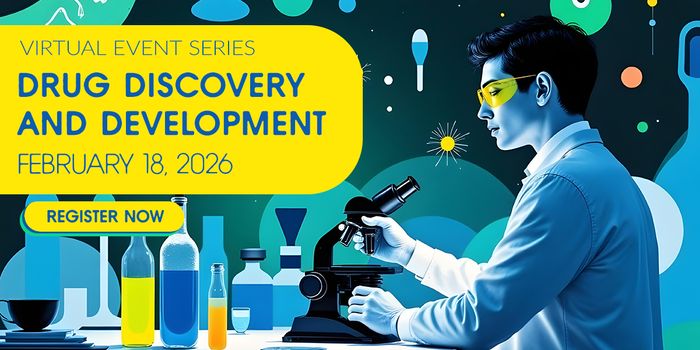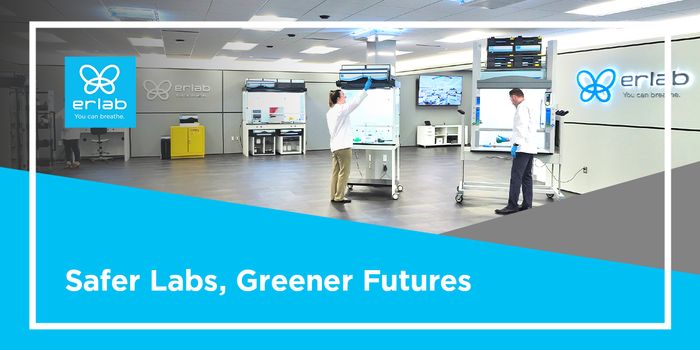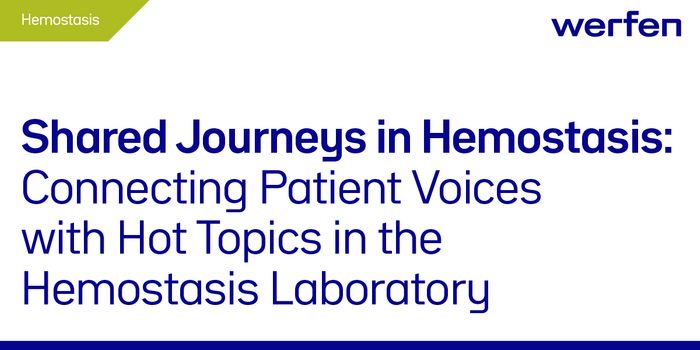Thermo Fisher Scientific: Science for Sustainability Symposia
Join the virtual Science for Sustainability Symposia
The sustainable use of raw materials in a way that conserves resources and protects the climate has been of central importance to the environment, the economy and society for many years.
Our use of plastics for instance in everyday items and manufacturing processes has resulted in a deluge of slowly degradable materials entering our environment and our food chain. Therefore, a sustainable use of raw materials is required in order to act in a resource and environmentally friendly way. Deepen your understanding of microplastic contaminants, bio-friendly alternatives to environmentally harmful materials and research into alternative energy resources and recycling.
Attend the virtual Science for Sustainability Symposia where international technical experts and scientists in the field will share perspectives to advance science, and to facilitate collaborations, in order to support researchers towards a cleaner, healthier and safer world.
|
Global Microplastics Symposium Hear from analytical experts as they review the challenges associated with identifying and quantifying contaminants, like plastics in the environment. Learn the best methods to provide meaningful data and important insights on studying the microplastics in different geo-environment and different sample matrices. It will end with a panel discussion where you can engage with experts looking to assessing risks and developing regulations for microplastics. |
Biomaterials & Recycling Symposium In this series, technical experts discuss how material characterization techniques have helped enabling research on recycling materials such as plastics, and on the manufacturing and characterization of innovative materials with sustainable properties such as biopolymers. |
Join us to learn about the latest innovations in sustainable materials and environmental research, while taking advantage of networking opportunities with experts. We look forward to staying connected with you virtually!
GLOBAL MICROPLASTICS AGENDA Share
-
On-Demand
Bioplastics- opportunities and limitations
Prof. Dr. Christoph Hess
Professor for non-metallic materials with the Faculty for Technology and Bionics at the Rhine-Waal Univerity of Applied Sciences, GermanyBIOGRAPHY -
On-Demand
Advanced rheological characterization for highly sensitive biobased materials
Ineke Velghe
KU Leuven Bruges Campus, Material Engineering Departement, Propolis research groupBIOGRAPHY -
On-Demand
Advanced rheological characterization for highly sensitive biobased materials
Prof. dr. ir. Frederik Desplentere
KU Leuven Bruges Campus, Material Engineering Departement, Propolis research groupBIOGRAPHY -
On-Demand
PHA Resin Development
Ray Bergstra, Ph.D.
Director of Technology and Business Development for TerraVerdae BioworksBIOGRAPHY -
On-Demand
Reactive extrusion as a tool for high performance biomass-derived polymers
Michael Forrester, Ph.D.
Research Scientist at Iowa State University, Chemical and Biological EngineeringBIOGRAPHY -
On-Demand
Plastic Recycling in the Circular Economy: Definitions, Characterization and Standardization of Recyclates
Madina Shamsuyeva, Dr.
Head of Department Plastics Technology, Recycling and Plastics Analytics at the Institute of Plastics and Circular Economy IKKBIOGRAPHY -
On-Demand
Understanding Catalyst Agglomeration for Water Electrolyzer Manufacturing
-
On-Demand
Magnetic and Mechanical Characterization of Additive Manufactured Strontium Ferrite/Polyamide 12 Composites Using Twin-Screw and Single-Screw Extrusion
Camila Belduque
Mechanical and Manufacturing Engineering grad student at Texas State UniversityBIOGRAPHY -
On-Demand
Microplastics in Hawaiian marine environments: Where and How do we find them
Jennifer Lynch, Ph.D.
Research Biologist, Co-director, Chemical Sciences Division, National Institute of Standards and Technology Hawaiʻi Pacific University, Center for Marine Debris ResearchBIOGRAPHY -
On-Demand
The effects of micro and nanoplastics on biota in the aquatic environment: what we know about hazard and risk
Susanne Brander, Ph.D.
Assistant Professor at the Dept. Of Fisheries and Wildlife, Coastal Oregon Marine Experiment Station, Oregon State UniversityBIOGRAPHY -
-
On-Demand
California's Path Towards Assessing Risks and Developing Regulations for Microplastics in Drinking Water
Scott Coffin, Ph.D.
Research Scientist III, California State Water Resources Control BoardBIOGRAPHY -
On-Demand
Microplastics measurement interlaboratory calibration study for drinking water
Charles Wong, Ph.D.
Department Head of Chemistry at Southern California Coastal Water Research Project AuthorityBIOGRAPHY -
-
On-Demand
Distribution and bioavailability of anthropogenic microparticles in California's coastal ecosystems
Clare Steele, Ph.D.
Assistant Professor of Environmental Science and Resource Management, California State University Channel IslandsBIOGRAPHY -
On-Demand
A nurdle in a haystack. The 2020 Mississippi River plastic pellet spill reveals widespread pellet contamination from multiple sources.
Mark Benfield, Ph.D.
Professor, College of the Coast and Environment, Department of Oceanography and Coastal Sciences, Baton Rouge, LABIOGRAPHY -
On-Demand
Comparison of microplastic identification methods using FTIR-ATR, FTIR-transmission with mapping, and Raman spectroscopy for beach sediment samples
Wonjoon Shim, Ph.D.
Principal research scientist of Korea Institute of Ocean Science and Technology (KIOST) and a professor of Department of Applied Ocean Sciences at Korea University of Science and TechnologyBIOGRAPHY -
On-Demand
FTIR and SEM analyses of microplastic chemistry, size, shape, and surfaces in various sample matrices
Jeff Wagner, Ph.D.
Research scientist with the California Department of Public Health Environmental, Health LaboratoryBIOGRAPHY -
On-Demand
Microplastics in the Sierra Nevada: From Peak to Pipe
Monica Arienzo, Ph.D.
Assistant Research Professor at the Desert Research Institute, Division of Hydrologic SciencesBIOGRAPHY -
On-Demand
Open Source Raman and IR Spectroscopy, Paving the Future for Spectral Analysis using Artificial Intelligence
-
On-Demand
Method standardization and technique development for FTIR and ATR-FTIR analyses in Belgian Research
Maaike Vercauteren, Ph.D.
Post-doc researcher at Blue Growth Research Lab and GhEnToxLab at Ghent University (Faculty of Bioscience engineering)BIOGRAPHY -
On-Demand
The complexity of microplastics and the implications for sampling and analysis.
Chelsea Rochman, Ph.D.
Assistant Professor at the Department of Ecology and Evolutionary Biology; Head of Operations & Science Programming and Application Lead, U of T Trash Team, University of Toronto, St. GeorgeBIOGRAPHY
Global Microplastics Symposium Speakers Share
-
Joel Andersen, Ph.D.
CTO, Cinthesis
BIOGRAPHY
-
Monica Arienzo, Ph.D.
Assistant Research Professor at the Desert Research Institute, Division of Hydrologic Sciences
BIOGRAPHY
-
Camila Belduque
Mechanical and Manufacturing Engineering grad student at Texas State University
BIOGRAPHY
-
Mark Benfield, Ph.D.
Professor, College of the Coast and Environment, Department of Oceanography and Coastal Sciences, Baton Rouge, LA
BIOGRAPHY
-
Ray Bergstra, Ph.D.
Director of Technology and Business Development for TerraVerdae Bioworks
BIOGRAPHY
-
Janice Brahney, Ph.D.
Assistant Professor at Utah State University
BIOGRAPHY
-
Susanne Brander, Ph.D.
Assistant Professor at the Dept. Of Fisheries and Wildlife, Coastal Oregon Marine Experiment Station, Oregon State University
BIOGRAPHY
-
Scott Coffin, Ph.D.
Research Scientist III, California State Water Resources Control Board
BIOGRAPHY
-
Dr. Win Cowger
Research Director, Moore Institute for Plastic Pollution Research, USA
-
Prof. dr. ir. Frederik Desplentere
KU Leuven Bruges Campus, Material Engineering Departement, Propolis research group
BIOGRAPHY
-
Elham Fini, Ph.D.
Associate Professor at Arizona State University
BIOGRAPHY
-
Michael Forrester, Ph.D.
Research Scientist at Iowa State University, Chemical and Biological Engineering
BIOGRAPHY
-
Prof. Dr. Christoph Hess
Professor for non-metallic materials with the Faculty for Technology and Bionics at the Rhine-Waal Univerity of Applied Sciences, Germany
BIOGRAPHY
-
Christy Hudak
Research Associate at the Center for Coastal Studies
BIOGRAPHY
-
Jennifer Lynch, Ph.D.
Research Biologist, Co-director, Chemical Sciences Division, National Institute of Standards and Technology Hawaiʻi Pacific University, Center for Marine Debris Research
BIOGRAPHY
-
Scott Mauger, Ph.D.
Staff Scientist at National Renewable Energy Laboratory
BIOGRAPHY
-
Charles and Shelly Moore
-
Chelsea Rochman, Ph.D.
Assistant Professor at the Department of Ecology and Evolutionary Biology; Head of Operations & Science Programming and Application Lead, U of T Trash Team, University of Toronto, St. George
BIOGRAPHY
-
Madina Shamsuyeva, Dr.
Head of Department Plastics Technology, Recycling and Plastics Analytics at the Institute of Plastics and Circular Economy IKK
BIOGRAPHY
-
Wonjoon Shim, Ph.D.
Principal research scientist of Korea Institute of Ocean Science and Technology (KIOST) and a professor of Department of Applied Ocean Sciences at Korea University of Science and Technology
BIOGRAPHY
-
Clare Steele, Ph.D.
Assistant Professor of Environmental Science and Resource Management, California State University Channel Islands
BIOGRAPHY
-
Ineke Velghe
KU Leuven Bruges Campus, Material Engineering Departement, Propolis research group
BIOGRAPHY
-
Maaike Vercauteren, Ph.D.
Post-doc researcher at Blue Growth Research Lab and GhEnToxLab at Ghent University (Faculty of Bioscience engineering)
BIOGRAPHY
-
Jeff Wagner, Ph.D.
Research scientist with the California Department of Public Health Environmental, Health Laboratory
BIOGRAPHY
-
Charles Wong, Ph.D.
Department Head of Chemistry at Southern California Coastal Water Research Project Authority
BIOGRAPHY

















































































